Born of the Gods Mechanics
The plane of Theros has been thrown into chaos by the ascension to godhood of the satyr Planeswalker Xenagos. Gods and mortals are pitted against each other, and terrifying monsters stalk the land. Will you stand with the heroes, or draw inspiration from the gods?
Inspired

Creatures with inspired abilities represent the divine inspiration that comes from the world of dreams.
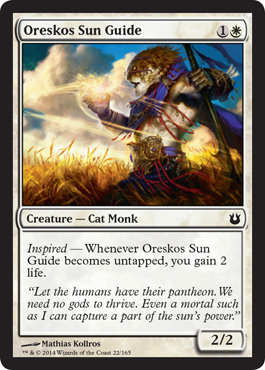
A creature's inspired ability triggers every time the creature becomes untapped. That's normally at the start of your turn, but an inspired ability triggers no matter how or when the creature untaps. The simplest way to get these creatures tapped is to attack with them, but this set also contains many cards that let you tap your creatures in other ways.
If multiple inspired abilities you control go on the stack at the same time, you get to decide in what order to put them on the stack. (The last one you add to the stack will resolve first, as usual.) Inspired abilities that trigger during the untap step are all put onto the stack as the upkeep step begins, at the same time as "at the beginning of your upkeep" triggers. You put your inspired triggers and upkeep triggers on the stack all at once, in any order you wish.
Tribute

A creature with a tribute ability offers your opponent a grim choice: either it becomes even larger, or it does something nasty to your opponent when it enters the battlefield. These effects include destroying permanents, dealing damage to your opponent, and fighting opposing creatures.
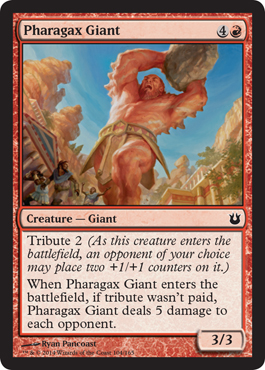
As Pharagax Giant enters the battlefield, you choose an opponent. That opponent then decides whether to "pay tribute" by having Pharagax Giant enter the battlefield with two +1/+1 counters on it. If he or she does, then that's it—you've got a bigger Giant. If he or she decides not to pay tribute, then Pharagax Giant's enters-the-battlefield ability will trigger instead. Either way, it's good for you—and in the meantime, you get to watch your opponent sweat.
Nyx and Bestow

The gods of Theros dwell in Nyx, a starry realm visible as the night sky of Theros. The gods and their servants are infused with the power and majesty of Nyx. Enchantment creatures in the Theros block all have a unique card frame that shows the starfield of Nyx.
The Nyx frame doesn't have any rules associated with it. It's just a reminder that these creatures are also enchantments. Other enchantments in Born of the Gods use the regular card frame.
Many enchantment creatures in Born of the Gods have the bestow keyword.
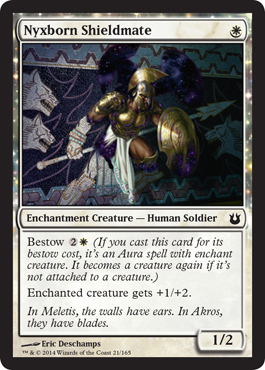
A creature with bestow gives you the option to cast it as an Aura that enchants a creature, granting that creature its power, toughness, and abilities.
When a card with bestow is in your hand, you have two options: cast it normally for its mana cost, or cast it for its bestow cost. If you cast a bestow card normally, it's an enchantment creature spell that resolves and becomes an enchantment creature on the battlefield. Its bestow ability and its "Enchanted creature gets..." text are ignored.
If you cast a card for its bestow cost, it's not a creature spell. Spells like [autocard]Essence Scatter[/autocard] that can target only a creature spell can't target it. Instead, it's an Aura spell with enchant creature, so you have to target a creature to cast it. It can be countered by spells like [autocard]Negate[/autocard] that target only noncreature spells. If the target creature has a heroic ability, the Aura spell with bestow will trigger it, just as any other Aura spell would. Cards with bestow are always enchantments, whether they're Auras or creatures.
If the target creature leaves the battlefield after you cast a card with bestow as an Aura but before the spell resolves, the Aura spell will resolve as an enchantment creature rather than being countered like a normal Aura spell. If the target creature is still on the battlefield when the Aura spell resolves, it resolves as an Aura enchanting that creature.
While it's enchanting a creature, an Aura with bestow grants the creature the bonuses listed in its text box. If the creature it's enchanting leaves the battlefield for any reason, the Aura immediately becomes an enchantment creature again rather than being put in the graveyard like other Auras.
Some bestow cards have abilities that do different things depending on whether the permanent with bestow is currently an Aura.
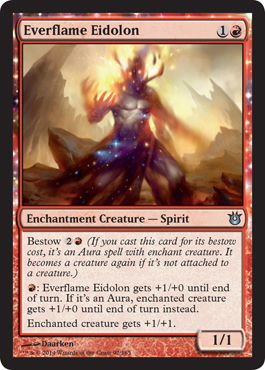
Everflame Eidolon's ability checks when it resolves to see what should get +1/+0—either Everflame Eidolon or the creature it's enchanting, whichever one is a creature at the time. This means that if you activate the ability while Everflame Eidolon is an Aura, but Everflame Eidolon is a creature by the time the ability resolves (say, because the enchanted creature has left the battlefield), Everflame Eidolon will get the bonus.
Devotion

The gods of Theros grant their favors to those whose devotion is great enough.
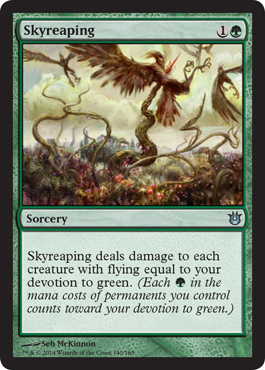
Your devotion to a color is the number of mana symbols of that color in the mana costs of permanents you control. There are cards that count devotion to each of the five colors, and they have many different effects based on that devotion. Some examples:
- A permanent that costs


- A permanent that costs



- A permanent that costs



Devotion counts only mana symbols in your permanents' mana costs—the cost in the upper right corner of the card. Mana symbols in text boxes, such as activation costs or the big mana symbols on basic lands, do not count toward your devotion. Only colored mana symbols count; it doesn't matter how much a permanent costs to cast, just how much colored mana. A permanent that looks at your devotion to a color counts the mana symbols in its own cost.
Because Skyreaping isn't a permanent, its own mana cost doesn't count toward your devotion. If you don't control any permanents with green mana symbols in their mana costs as Skyreaping resolves, it won't deal any damage.
Gods

Five gods appear on cards in Born of the Gods as legendary enchantment creatures with the creature type God. Where the Theros Gods were monocolored, each God in Born of the Gods is two colors. A two-color God manifests as a creature on the battlefield once your devotion to its colors is high enough.
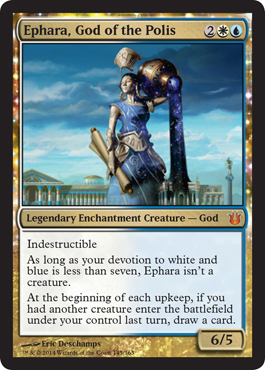
Your devotion to white and blue is the total number of mana symbols that are white or blue among the mana costs of permanents you control. So, if you control permanents with mana costs of ![]()
![]()
![]()
![]()
![]()
![]()
![]()
Hybrid mana symbols such as ![]()
Like the Theros Gods, each of the Born of the Gods Gods has indestructible, and each one is a creature only if you have enough devotion to its colors. If a God enters the battlefield while your devotion to its colors is less than the required number (counting its own mana symbols, as usual), abilities that trigger when a creature enters the battlefield won't trigger. If a God on the battlefield is a creature and your devotion to its colors drops below the required number, it immediately stops being a creature. A God can't attack the turn it enters the battlefield unless it has haste, even if it wasn't a creature as it entered the battlefield.
Gods are always legendary enchantments, and their abilities work whether they're creatures or not. Ephara triggers at the beginning of each upkeep, regardless of your current devotion to white and blue.
Heroic

A creature with a heroic ability gives you powerful benefits every time you cast a spell that targets it.
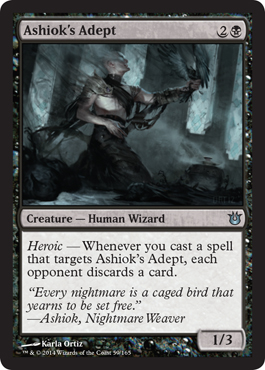
A heroic ability triggers whenever you cast any spell that targets the heroic creature, including a spell that also targets another creature. If a spell targets multiple creatures with heroic abilities, all of them trigger. Activated abilities, such as equip, do not cause heroic abilities to trigger, nor do triggered abilities such as the enters-the-battlefield ability of [autocard]Breaching Hippocamp[/autocard].
An instant or sorcery spell has a target if it includes the word "target" in its rules text. Each Aura spell also has a target, indicated by its enchant ability. Creature spells and other permanent spells (except for Auras) never have targets.
A heroic ability triggers only when the creature's controller casts a spell that targets it, not when any other player does.
Scry

The scry mechanic lets you manipulate your destiny.
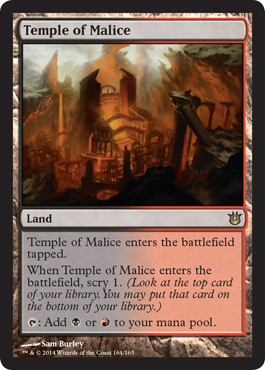
Scry is a keyword action that always has a number associated with it. To scry, look at that many cards from the top of your library, put as many of them as you want on the bottom of your library, and leave the rest on top in any order you choose. When you scry 1, that translates to looking at the top card of your library and deciding whether you want it on the top of your library or the bottom. When you scry 2 or more, you have more options.
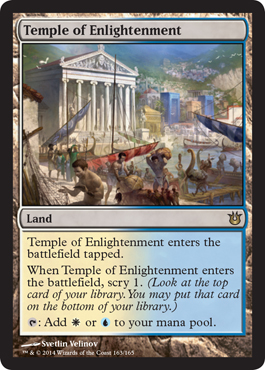 |
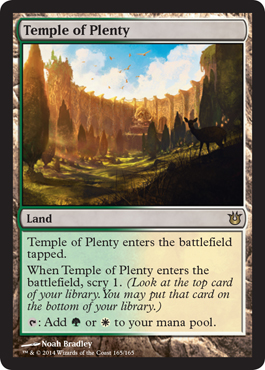 |
"Archetypes"

Born of the Gods contains a cycle of five enchantment creatures, one of each color, called Archetypes.
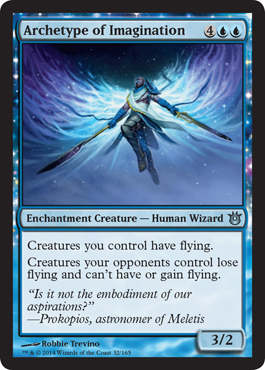
Each Archetype has two abilities: one that grants a keyword ability to all of your creatures, including itself, and one that makes your opponents' creatures lose that same keyword.
That first ability is straightforward—all your creatures have flying. The second ability is worded so that it doesn't matter how or when your opponent's creatures would have or gain flying. Whether they have flying printed on them, gained flying before your Archetype of Imagination entered the battlefield, try to gain it after your Archetype of Imagination entered the battlefield, or are being granted flying continuously (say, by another Archetype of Imagination), they can't have flying for any reason while you control Archetype of Imagination.
This means that if two players each control Archetype of Imagination, none of their creatures have flying.
